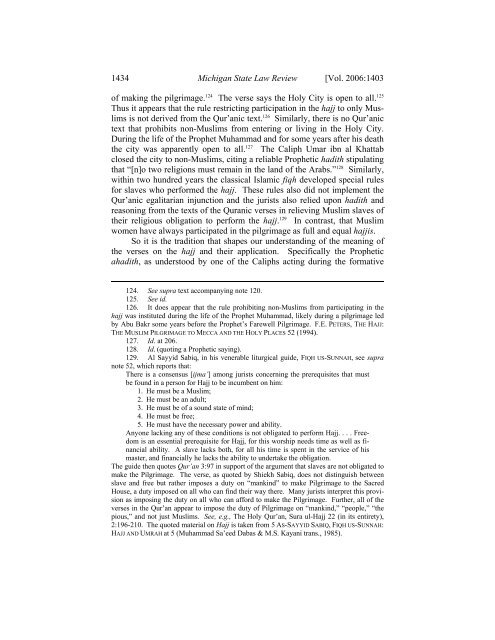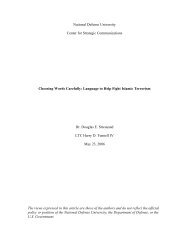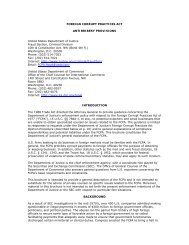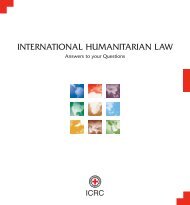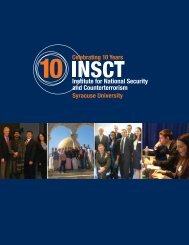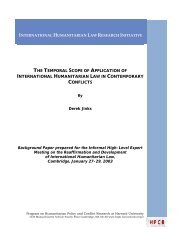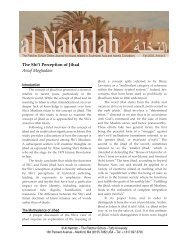some reflection on post-enlightenment qur'anic hermeneutics
some reflection on post-enlightenment qur'anic hermeneutics
some reflection on post-enlightenment qur'anic hermeneutics
Create successful ePaper yourself
Turn your PDF publications into a flip-book with our unique Google optimized e-Paper software.
1434 Michigan State Law Review [Vol. 2006:1403of making the pilgrimage. 124 The verse says the Holy City is open to all. 125Thus it appears that the rule restricting participati<strong>on</strong> in the hajj to <strong>on</strong>ly Muslimsis not derived from the Qur’anic text. 126 Similarly, there is no Qur’anictext that prohibits n<strong>on</strong>-Muslims from entering or living in the Holy City.During the life of the Prophet Muhammad and for <str<strong>on</strong>g>some</str<strong>on</strong>g> years after his deaththe city was apparently open to all. 127 The Caliph Umar ibn al Khattabclosed the city to n<strong>on</strong>-Muslims, citing a reliable Prophetic hadith stipulatingthat “[n]o two religi<strong>on</strong>s must remain in the land of the Arabs.” 128 Similarly,within two hundred years the classical Islamic fiqh developed special rulesfor slaves who performed the hajj. These rules also did not implement theQur’anic egalitarian injuncti<strong>on</strong> and the jurists also relied up<strong>on</strong> hadith andreas<strong>on</strong>ing from the texts of the Quranic verses in relieving Muslim slaves oftheir religious obligati<strong>on</strong> to perform the hajj. 129 In c<strong>on</strong>trast, that Muslimwomen have always participated in the pilgrimage as full and equal hajjis.So it is the traditi<strong>on</strong> that shapes our understanding of the meaning ofthe verses <strong>on</strong> the hajj and their applicati<strong>on</strong>. Specifically the Propheticahadith, as understood by <strong>on</strong>e of the Caliphs acting during the formative124. See supra text accompanying note 120.125. See id.126. It does appear that the rule prohibiting n<strong>on</strong>-Muslims from participating in thehajj was instituted during the life of the Prophet Muhammad, likely during a pilgrimage ledby Abu Bakr <str<strong>on</strong>g>some</str<strong>on</strong>g> years before the Prophet’s Farewell Pilgrimage. F.E. PETERS, THE HAJJ:THE MUSLIM PILGRIMAGE TO MECCA AND THE HOLY PLACES 52 (1994).127. Id. at 206.128. Id. (quoting a Prophetic saying).129. Al Sayyid Sabiq, in his venerable liturgical guide, FIQH US-SUNNAH, see supranote 52, which reports that:There is a c<strong>on</strong>sensus [ijma’] am<strong>on</strong>g jurists c<strong>on</strong>cerning the prerequisites that mustbe found in a pers<strong>on</strong> for Hajj to be incumbent <strong>on</strong> him:1. He must be a Muslim;2. He must be an adult;3. He must be of a sound state of mind;4. He must be free;5. He must have the necessary power and ability.Any<strong>on</strong>e lacking any of these c<strong>on</strong>diti<strong>on</strong>s is not obligated to perform Hajj. . . . Freedomis an essential prerequisite for Hajj, for this worship needs time as well as financialability. A slave lacks both, for all his time is spent in the service of hismaster, and financially he lacks the ability to undertake the obligati<strong>on</strong>.The guide then quotes Qur’an 3:97 in support of the argument that slaves are not obligated tomake the Pilgrimage. The verse, as quoted by Shiekh Sabiq, does not distinguish betweenslave and free but rather imposes a duty <strong>on</strong> “mankind” to make Pilgrimage to the SacredHouse, a duty imposed <strong>on</strong> all who can find their way there. Many jurists interpret this provisi<strong>on</strong>as imposing the duty <strong>on</strong> all who can afford to make the Pilgrimage. Further, all of theverses in the Qur’an appear to impose the duty of Pilgrimage <strong>on</strong> “mankind,” “people,” “thepious,” and not just Muslims. See, e.g., The Holy Qur’an, Sura ul-Hajj 22 (in its entirety),2:196-210. The quoted material <strong>on</strong> Hajj is taken from 5 AS-SAYYID SABIQ, FIQH US-SUNNAH:HAJJ AND UMRAH at 5 (Muhammad Sa’eed Dabas & M.S. Kayani trans., 1985).


